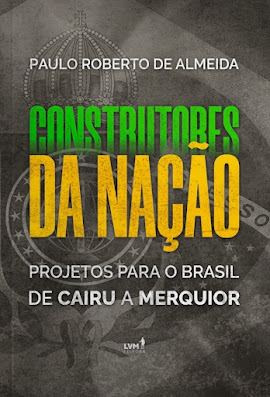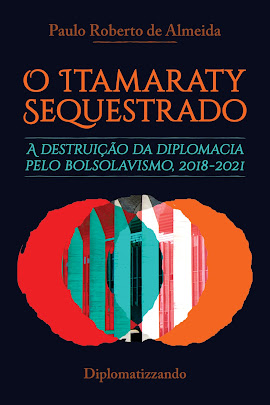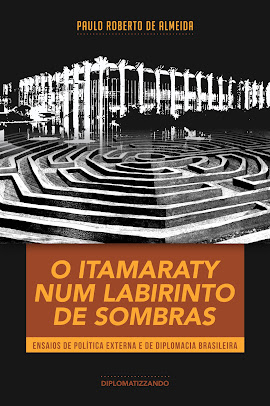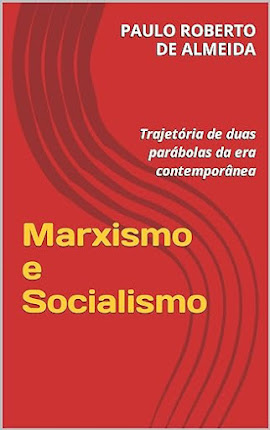Temas de relações internacionais, de política externa e de diplomacia brasileira, com ênfase em políticas econômicas, em viagens, livros e cultura em geral. Um quilombo de resistência intelectual em defesa da racionalidade, da inteligência e das liberdades democráticas.
O que é este blog?
Este blog trata basicamente de ideias, se possível inteligentes, para pessoas inteligentes. Ele também se ocupa de ideias aplicadas à política, em especial à política econômica. Ele constitui uma tentativa de manter um pensamento crítico e independente sobre livros, sobre questões culturais em geral, focando numa discussão bem informada sobre temas de relações internacionais e de política externa do Brasil. Para meus livros e ensaios ver o website: www.pralmeida.org. Para a maior parte de meus textos, ver minha página na plataforma Academia.edu, link: https://itamaraty.academia.edu/PauloRobertodeAlmeida;
Meu Twitter: https://twitter.com/PauloAlmeida53
Facebook: https://www.facebook.com/paulobooks
quarta-feira, 22 de janeiro de 2020
Biographies of Great Economists: books selected by Ross Emmett
terça-feira, 21 de janeiro de 2020
A China no WEF de Davos: do socialismo de Deng ao capitalismo de Estado (NYT)
The Story of China’s Economic Rise Unfolds in Switzerland

LIVRES: movimento liberal suprapartidário
Minha colaboração é puramente intelectual, ou seja, faço, escrevo, divulgo exatamente o que penso, pois, sendo ao mesmo tempo libertário e contrarianista, jamais aceitaria cumprir instruções de quem quer que seja, partido, movimento, aliança, iniciativa, o que for.
Como diz o nome, sou livre de me associar a iniciativas do LIVRES se com elas concordar. No mais, conservo minha total autonomia de pensamento e ação.
Paulo Roberto de Almeida
Brasília, 21 de janeiro de 2020
Presidente do Livres anuncia que não vai se candidatar em 2020
Nota da Anpuh sobre o ministro da Deseducassão (ele mesmo)
NOTA DA ANPUH-BRASIL A RESPEITO DA PORTARIA N. 2.227, DE 31 DE DEZEMBRO DE 2019.
A direção nacional da ANPUH-BRASIL manifesta sua indignação com a portaria de número 2.227, de 31 de dezembro de 2019. Por este documento, o Ministério da Educação limita drasticamente a liberação de docentes para apresentação dos resultados de seus projetos de pesquisa em eventos nacionais e internacionais. A nosso ver, tal proibição é, além da perversa, fruto da mente de um ministro rechaçado pela comunidade acadêmica. É fato que há ainda alguns bolsonaristas nas universidades, mas é difícil encontrar um docente que tenha coragem de vir a público para defender o indesculpável.
Os que não produzem conhecimento costumam apoiar um indivíduo tosco, como o famoso ministro guarda-chuva, cuja obrigação legal e moral é a de defender a educação, e não a de destruí-la. O digníssimo Ministro não se importa com os efeitos daquela proposta, pela simples razão de que ele e seu colegas não representam reflexão alguma e sequer são capazes de dialogar com a comunidade que dizem fazer parte.
Quem em sã consciência convidaria um ministro da educação que sequer domina a língua portuguesa e se diverte com as besteiras que ele mesmo vincula na internet? Qual seria o teor de uma eventual conferência do ministro da educação em importantes eventos como o prestigiado Simpósio Nacional de História da ANPUH? A associação se reúne em eventos estaduais bianuais (anos pares), sob a coordenação das regionais e, a cada dois anos (anos ímpares), também há nosso evento nacional, com a participação média de mais de 4500 pessoas. O próximo será em julho em 2021, em Fortaleza.
De fato, o controle anunciado pelo governo, que dificulta a liberação de professores e professoras para participação de congressos, colóquios e de tantas outras atividades, tem como único objetivo colocar em risco a presença dos cientistas em importantes eventos distribuídos no país e no exterior. Neste último caso, pretende-se limitar ainda mais a visibilidade de nosso trabalho, inviabilizando a internacionalização do conhecimento produzido pelas universidades públicas do brasileiras.
Mas a desfaçatez é ainda maior. O que o governo não tem coragem de dizer é que muitos docentes retiram dinheiro do próprio bolso para expor seus estudos nos eventos que julgam importantes. O sistema de auxílio aos professores e professoras é cada vez mais exíguo, em face dos poucos recursos drenados para a produção da ciência nacional e sua divulgação em congressos, no país e no exterior. Como se não bastasse, o governo tenta agora limitar a circulação e disseminação do saber. Se a intenção é a de economizar recursos, apresentem os dados. É preciso que a população tenha acesso aos valores que este governo gasta para a circulação acadêmica dos cientistas; servidores públicos das centenas de universidades da Nação. Não há argumentos plausíveis para este novo descalabro. A batalha continua, pois ao contrário do senhor Ministro nós sabemos que o conhecimento nos liberta, o sofrimento nos mobiliza e a empatia nos protege. E é em nome dessa máxima que explicitamos mais uma vez a face mais sombria do anti-intelectualismo do governo.
História em combate
Associação Nacional de História - ANPUH-Brasil
A map of the World
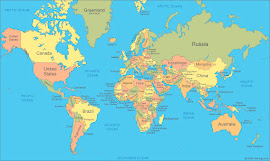
Geology.com
Treze ideias fora do lugar nas relações internacionais do Brasil
Uma certa ideia do Itamaraty (2020)
Pesquisar este blog
Obras do autor:
Prata da Casa: os livros dos diplomatas
Volta ao Mundo em 25 Ensaios
Paralelos com o Meridiano 47
O Panorama visto em Mundorama
Rompendo Fronteiras
Codex Diplomaticus Brasiliensis
Polindo a Prata da Casa
Livros editados por PRA
Colaboração a livros coletivos
Capítulos de livros publicados
Teses e dissertações
Artigos em periódicos
Resenhas de livros
Colaborações regulares
Videos no YouTube
Últimas Postagens:
-
▼
2024
(981)
-
▼
julho
(10)
- Obituary: Democracy - Teresa Joyce (Threads)
- De “grande conchavão”, Lula entende - Felipe Moura...
- Guilhon e as novas “pedras preciosas” - José Augus...
- Putin’s regime or the war: which will end first? -...
- Para entender rapidamente a eleição francesa - And...
- Confederação do Equador: 200 anos; seminário comem...
- Promoções no Itamaraty: junho de 2024
- Plano Real: 30 anos desde o 1o de julho de 1994: o...
- Politica econômica de Lula preserva estagnação ou ...
- Eleições francesas, por Jean Quatremer (Le Monde)
-
▼
julho
(10)
Paulo Roberto e Carmen Lícia

No festival de cinema de Gramado, 2016
Breve Perfil
Paulo Roberto de Almeida
Doutor em Ciências Sociais, com vocação acadêmica voltada para os temas de relações internacionais, de história diplomática do Brasil e para questões do desenvolvimento econômico. Profissionalmente, sou membro da carreira diplomática desde 1977. Minhas preocupações cidadãs voltam-se para os objetivos do desenvolvimento nacional, do progresso social e da inserção internacional do Brasil. Entendo que cinco das condições básicas para que tais objetivos sejam atingidos podem ser resumidas como segue: macroeconomia estável, microeconomia competitiva, boa governança, alta qualidade dos recursos humanos e abertura ao comércio internacional e aos investimentos estrangeiros. Este blog serve apenas de divertissement. Para meus trabalhos mais sérios, ou pelo menos de caráter acadêmico, ver o site http://www.pralmeida.org/.
PRA on Academia.edu
PRA on Research Gate
Works PRA
- Carreira na diplomacia
- Iluminuras: minha vida com os livros
- Manifesto Globalista
- Sun Tzu para Diplomatas: uma estratégia
- Entrevista ao Brasil Paralelo
- Dez grandes derrotados da nossa história
- Dez obras para entender o Brasil
- O lulopetismo diplomático
- Teoria geral do lulopetismo
- The Great Destruction in Brazil
- Lista de trabalhos originais
- Lista de trabalhos publicados
- Paulo Roberto de Almeida
- Works in English, French, Spanish
Outros blogs do autor
Total de visualizações de página
Translate
Détente...

Carmen Lícia e Paulo Roberto
Uma seleção de textos
- Tobias Barreto: ingresso no IHG-DF
- Manifesto Globalista
- The Great Destruction on Brazil
- Manual pratico de decadência
- Miséria da Oposição no Brasil
- Pensamento Diplomatico Brasileiro
- Tratado Geral da Mafia
- A globalizacao e seus descontentes
- Aumentam os idiotas no mundo
- Dez regras modernas de diplomacia
- Contra a anti-globalizacao
- Diplomacia: dicas de ingresso na carreira
- Falacias Academicas: discutindo os mitos
- Mini-tratado das reticencias...
- O fim do desenvolvimento
- Sete Pecados da Esquerda
- Uma agenda ainda valida?
- Uma proposta modesta: a reforma do Brasil
Links
Uma reflexão...
Extratos (adaptados) de Ciência: problemas, objetivos e responsabilidades (Popper falando a biólogos, em 1963, em plena Guerra Fria):
"A tarefa mais importante de um cientista é certamente contribuir para o avanço de sua área de conhecimento. A segunda tarefa mais importante é escapar da visão estreita de uma especialização excessiva, interessando-se ativamente por outros campos em busca do aperfeiçoamento pelo saber que é a missão cultural da ciência. A terceira tarefa é estender aos demais a compreensão de seus conhecimentos, reduzindo ao mínimo o jargão científico, do qual muitos de nós temos orgulho. Um orgulho desse tipo é compreensível. Mas ele é um erro. Deveria ser nosso orgulho ensinar a nós mesmos, da melhor forma possível, a sempre falar tão simplesmente, claramente e despretensiosamente quanto possível, evitando como uma praga a sugestão de que estamos de posse de um conhecimento que é muito profundo para ser expresso de maneira clara e simples.
Esta, é, eu acredito, uma das maiores e mais urgentes responsabilidades sociais dos cientistas. Talvez a maior. Porque esta tarefa está intimamente ligada à sobrevivência da sociedade aberta e da democracia.
Uma sociedade aberta (isto é, uma sociedade baseada na idéia de não apenas tolerar opiniões dissidentes mas de respeitá-las) e uma democracia (isto é, uma forma de governo devotado à proteção de uma sociedade aberta) não podem florescer se a ciência torna-se a propriedade exclusiva de um conjunto fechado de cientistas.
Eu acredito que o hábito de sempre declarar tão claramente quanto possível nosso problema, assim como o estado atual de discussão desse problema, faria muito em favor da tarefa importante de fazer a ciência -- isto é, as idéias científicas -- ser melhor e mais amplamente compreendida."
Karl R. Popper: The Myth of the Framework (in defence of science and rationality). Edited by M. A. Notturno. (London: Routledge, 1994), p. 109.
Uma recomendação...
“Por favor, não se tornem hayekianos, pois cheguei à conclusão que os keynesianos são muito piores que Keynes e os marxistas bem piores que Marx”.
(Recomendação feita a jovens estudantes de economia, admiradores de sua obra, num jantar em Londres, em 1985)
ShareThis
Postagem em destaqueLivro Marxismo e Socialismo finalmente disponível - Paulo Roberto de AlmeidaMeu mais recente livro – que não tem nada a ver com o governo atual ou com sua diplomacia esquizofrênica, já vou logo avisando – ficou final... 
|
|


